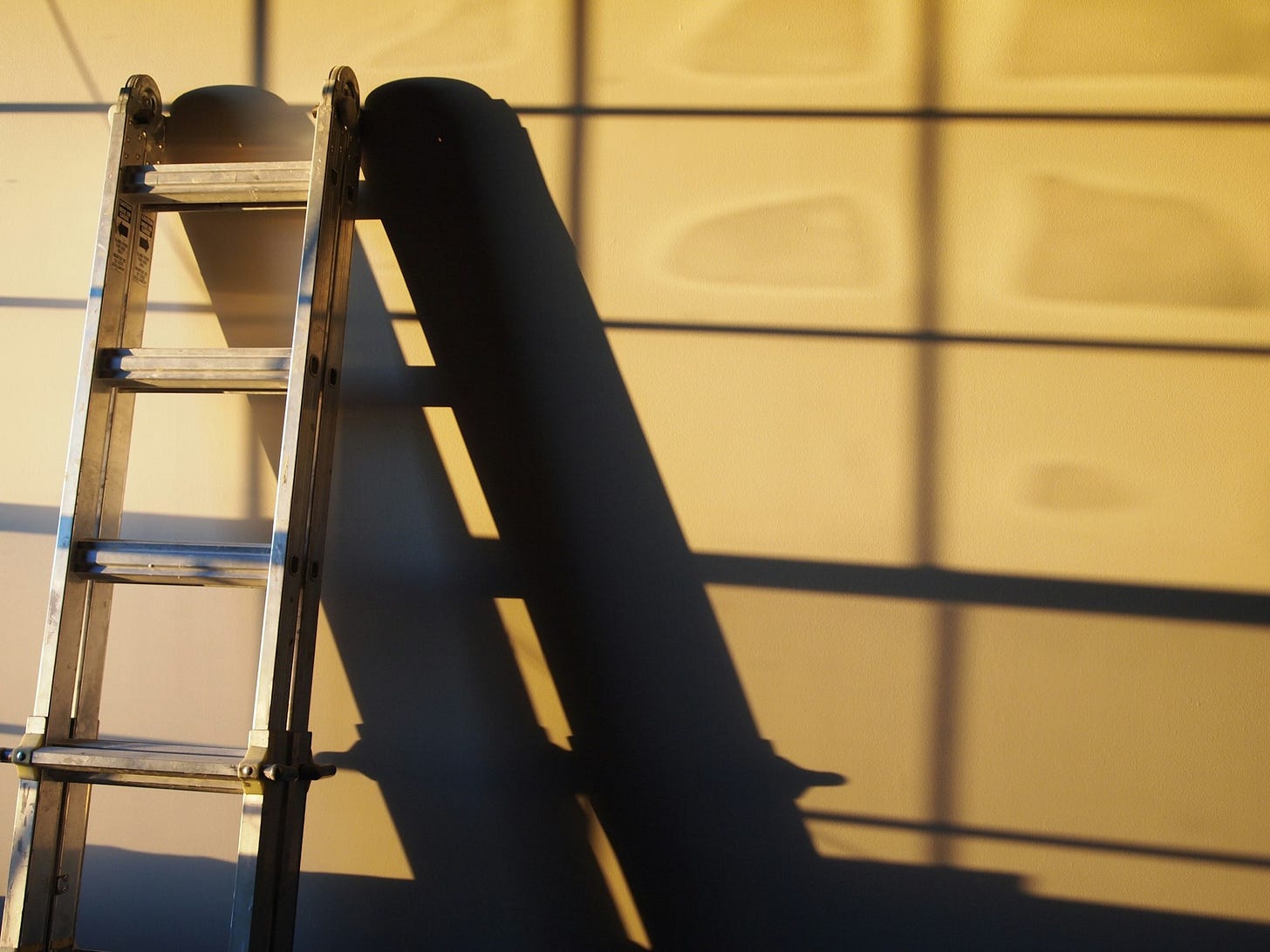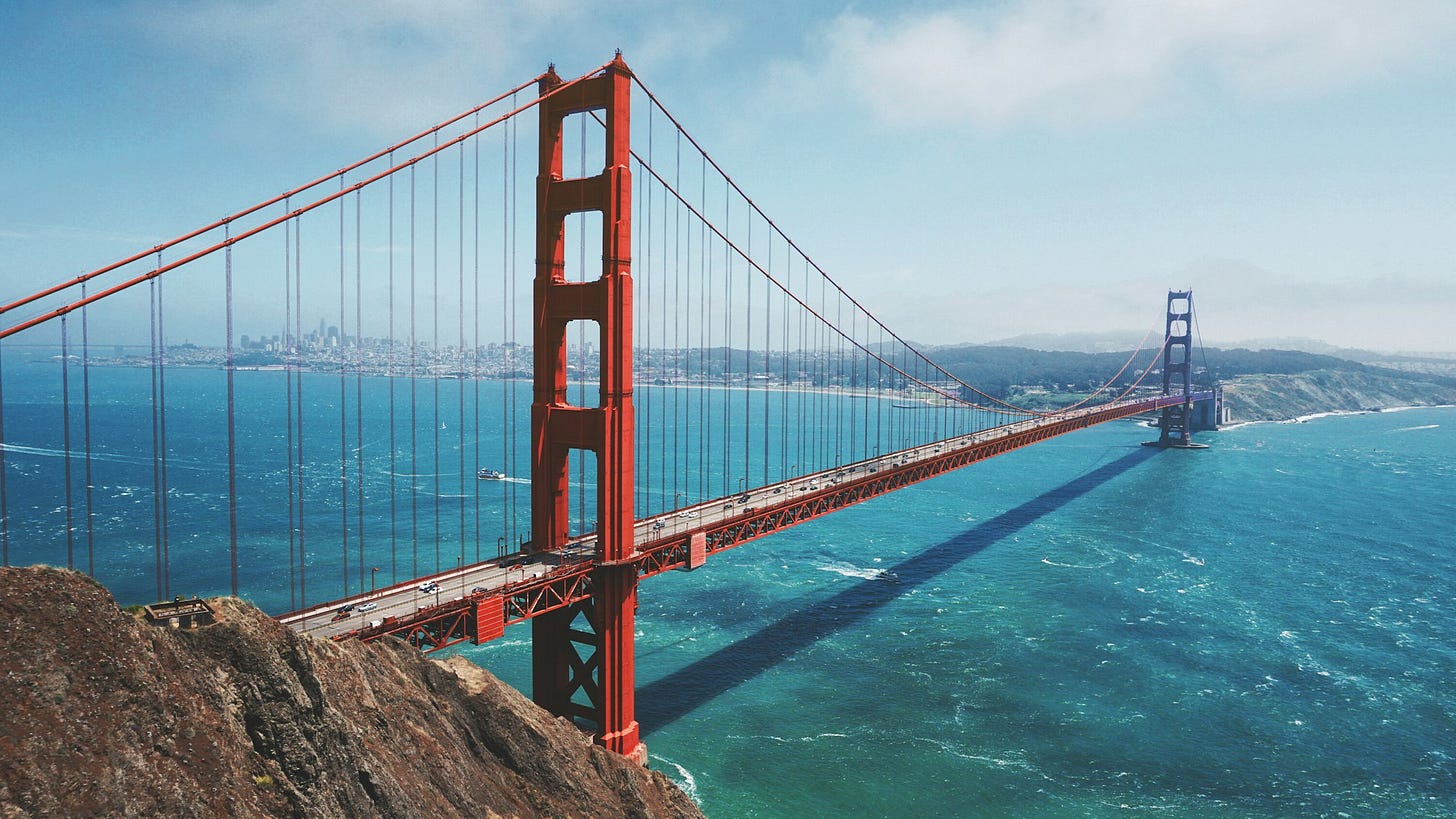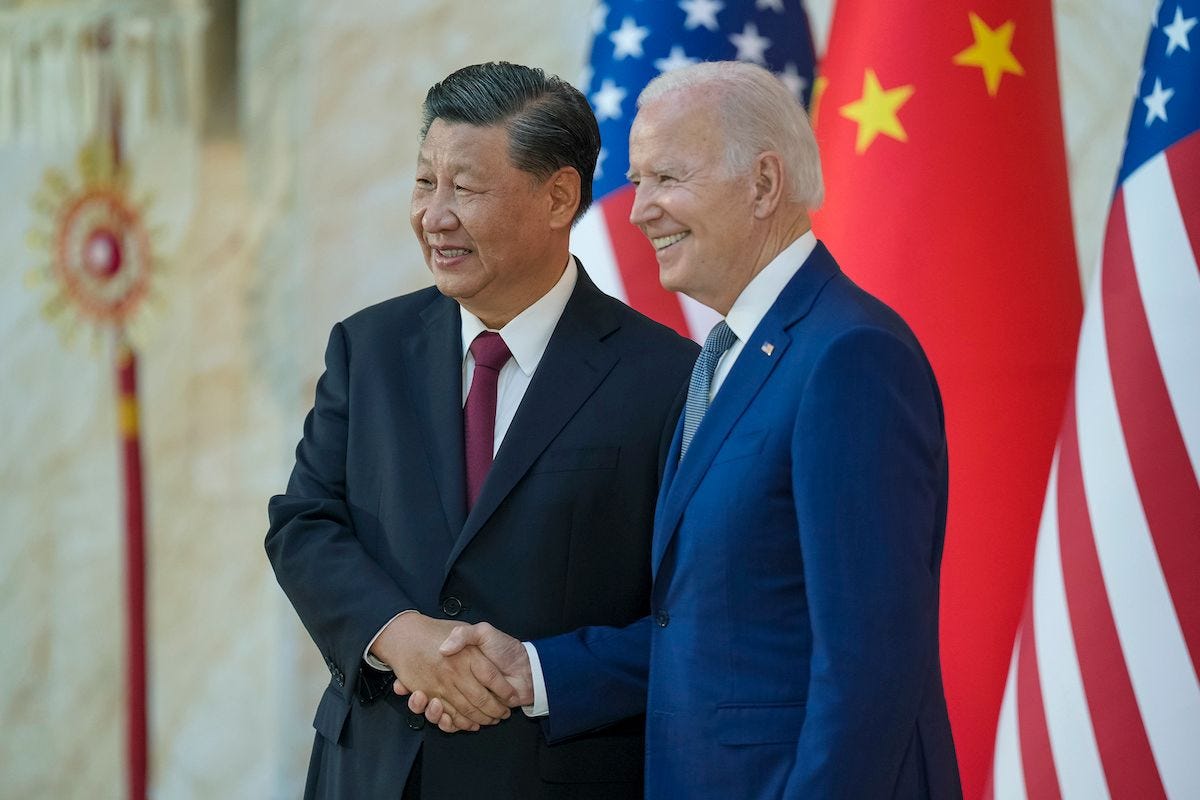Inside the Biden-Xi meeting
A long list of contentious issues are on the agenda as the world’s two most powerful men sit down in San Francisco.
Good morning! It’s Wednesday, November 15, 2023. The 2024 elections are 356 days away. If this newsletter was forwarded to you, subscribe here. If you want to contribute to support my work, donate here.
Competing with China was supposed to be the cornerstone of President Biden’s foreign policy. He entered office determined to avoid being sucked into the European and Middle Eastern crises that had bedeviled his predecessors, hoping to finally implement the “pivot to Asia” promised but never fully realized under Barack Obama.
In his administration’s first national security guidance, issued in March 2021, China is mentioned more than any other country — 15 times in 18 pages, compared to five references to Russia and four to the Middle East. While those are portrayed as conflicts of the past, China is presented as America’s rival of the future.
“It is the only competitor potentially capable of combining its economic, diplomatic, military, and technological power to mount a sustained challenge to a stable and open international system,” the document warns of China, implicitly dismissing Russia.
Even as recently as last month, when Biden’s national security adviser Jake Sullivan laid out Biden’s international agenda in a lengthy article in Foreign Policy magazine, China was at the center. “Although the Middle East remains beset with perennial challenges, the region is quieter than it has been for decades,” Sullivan wrote, just days before Hamas would attack Israel. (That passage has since been scrubbed from the online version of the article.)
Sullivan titled that section of his essay, “Pick your battles.” But, of course, sometimes your battles are picked for you. Twice now, Biden’s laser-focus on China has been forced to stray, first when his attention was pulled westward to the war in Ukraine and now again to the war in Gaza.
Biden will snap back to focus today when he meets with Chinese president Xi Jinping, their first face-to-face sit-down since a meeting in Bali exactly one year ago this week.
Today’s meeting, which will take place on the sidelines of the Asia-Pacific Economic Cooperation (APEC) summit in San Francisco, comes at a precarious moment for the world and for the two leaders.
Biden is less than a year away from facing re-election, contending with dismal approval ratings and an American malaise towards the economy. Xi, of course, does not face the same electoral threats to his power — but is nonetheless in “his most vulnerable moment since coming to power 11 years ago,” as the Washington Post put it, due to an economic slump so bad that his country has simply stopped releasing youth unemployment statistics.
The two leaders — perhaps the world’s most powerful men — have much to discuss: their contrary positions on both aforementioned wars (China has aided Russia and refused to explicitly condemn Hamas); Chinese aggression around Taiwan and the South China Sea; American efforts to block China’s tech ambitions; China’s brutal treatment of the Uyghurs.
“[The meeting] is going to cover the waterfront: economics, technology, military-to-military ties, concerns that the United States has on issues associated with human rights or maritime matters or economic coercion, concerns China has about what the United States is doing in certain respects,” Sullivan, the national security adviser, told Puck News.
“Pretty much, you name it, it will be on the agenda, because that is the nature of the depth and breadth of the relationship between the U.S. and China,” he added.
Biden and Xi come to the meeting with a long history, dating back to their concurrent service as vice presidents of their respective countries. Biden likes to brag that he has spent more time than any other head of state with Xi, frequently claiming that they’ve traveled 17,000 miles together. (The claim has been repeatedly debunked.)
“He doesn’t have a democratic — with a small ‘d’ — bone in his body, but he’s a smart, smart guy,” Biden said of Xi in 2021.
American officials have been trying to lower expectations for today’s meeting. The phrase that Biden aides most often use in reference to China is “managing the competition”: wrestling for financial power — the days of the “Chimerica” economic partnership are over — while ensuring that the rivalry doesn’t spiral out of control.
As such, the San Francisco summit is being presented as an opportunity to at least get U.S.-China communications back on track, returning their relationship to a stable footing after incidents like the recent spy balloon and a Chinese clash with the U.S.-allied Philippines in the disputed South China Sea. (Even the Chinese pandas at the U.S. National Zoo are gone, a sign of current tensions.)
The list of expected “deliverables” from today’s meeting is short, but includes some notable action items:
A partial reopening of military-to-military communications between the two countries, which have been suspended since then-House Speaker Nancy Pelosi’s trip to Taiwan last year.
A deal to crack down on fentanyl, which is now the leading cause of death among Americans aged 18-45. Under the agreement, Beijing will go after Chinese companies that produce and export the source material behind the deadly opioid, while the U.S. will lift restrictions on China’s Institute of Forensic Science.
A joint pledge to limit greenhouse gas emissions and ramp up renewable energy production. China is the world’s largest carbon polluter, followed by the U.S.
An agreement to limit the use of artificial intelligence (AI) in nuclear weapons systems.
Unlike most foreign leader meetings, the U.S. and China are not expected to issue a joint statement after today’s sit-down.
When Biden entered office, Chinese officials reportedly thought U.S. policy and rhetoric towards China would soften after having ratcheted up under Donald Trump. Instead, to the surprise of some observers, Biden left Trump’s China tariffs in place; the need to stay tough on Beijing has become an article of faith in Democratic and Republican circles, a rare note of bipartisan consensus in Washington.
Much of Biden’s foreign policy can be understood through this lens, whether his creation of the “AUKUS” partnership with the UK and Australia, his promotion of the “Quad” alliance with Australia, India, and Japan; his Camp David summit with Japan and South Korea; or his attempts to shore up relationships in Africa and Latin America, countering Chinese investment in both regions.
Last night, at a campaign fundraiser in San Francisco, Biden boasted that his policies have yielded positive results, seeming to take a dig at the internal turmoil facing the leader he’d meet with the next day.
“President Xi is another example of how we’re reestablishing American leadership in the world,” he said. “It’s taking hold. They’ve got real problems.”
More news to know.

The House passed Speaker Mike Johnson’s “laddered” stopgap spending bill, which would fund some government agencies through January 19 and the rest through February 2. The vote was 336-95, with 127 Republicans and 209 Democrats backing the backing and 93 Republicans and two Democrats opposing it.
The bill now goes to the Senate, where Majority Leader Chuck Schumer (D-NY) has signaled his support despite initial skepticism.
More headlines:
ISRAEL: Israeli troops enter Gaza’s Al Shifa hospital in culmination of siege / Reuters
U.S. Says Hamas Operates Out of Gaza Hospitals, Endorsing Israel’s Allegations / NYT
US Frustration With Israel Grows as Gaza Civilian Deaths Mount / Bloomberg
Senate Democrats block bipartisan House Israel aid bill / Fox News
CAMPAIGN: House Speaker Mike Johnson endorses Trump, defends ‘stolen election’ claims / CNBC
Michigan judge denies effort to keep Trump off 2024 ballot / NBC
What happened to ‘woke’? How the right’s rallying cry faded away / Semafor
CONGRESS: Congressional pressure cooker explodes as personal feuds turn physical / Axios
The day ahead.

All times Eastern.
President Biden is in San Francisco for the Asia-Pacific Economic Cooperation (APEC) summit, which is attended by leaders of all 21 countries that border the Pacific Ocean. Biden will meet with President Xi Jinping of China at 2 p.m., hold a press conference at 7:15 p.m., and host a reception for APEC leaders at 10:30 p.m.
Vice President Harris will join Biden for the APEC reception.
The Senate may hold votes related to the H.R. 6363, the “laddered CR” passed by the House.
The House will vote on final passage of H.R. 5894, the Labor/Health and Human Services appropriations bill.
Before I go...
Here’s something interesting: After sitting down with Biden this afternoon, Xi Jinping will have dinner with a delegation of American business leaders.
Per Bloomberg, the invite list includes a group who can boast longer ties with Xi than almost any Americans: a collection of Iowans who hosted the then-unknown Chinese official “for a hog roast, farm tours and a Mississippi River boat ride” almost 40 years ago when he visited the Hawkeye State to try to understand American agriculture.
At the time, Xi was 31 years old; he stayed in one of the Iowans’ childhood bedrooms, decorated with “Star Trek” paraphanelia.
The Chinese leader and the Midwesterners have unexpectedly stayed in touch over the years, even as relations between their two countries have frayed. When Xi came to the U.S. in 2012, he gathered them in one of their Muscatine, Iowa, homes. “You were the first people I met in America, and to me, you are America,” he told them at the time.
He later invited the group to China: “Well, I just had to meet the people from Iowa,” his wife said, hosting them for a banquet.
“This has been a heck of a journey — we can’t figure it out,” one of the Iowans, 85-year-old Sarah Lande, told Bloomberg. “We don’t even know why he likes us!”
Read the full story here — for free!
Thanks for reading.
I get up each morning to write Wake Up To Politics because I’m committed to offering an independent and reliable news source that helps you navigate our political system and understand what’s going on in government.
The newsletter is completely free and ad-free — but if you appreciate the work that goes into it, here’s how you can help:
Donate to support my work or set up a recurring donation (akin to a regular subscription to another news outlet).
Buy some WUTP merchandise to show off your support (and score a cool mug or hoodie in the process!)
Tell your family, friends, and colleagues to sign up at wakeuptopolitics.com. Every forward helps!
If you have any questions or feedback, feel free to email me: my inbox is always open.
Thanks so much for waking up to politics! Have a great day.
— Gabe



